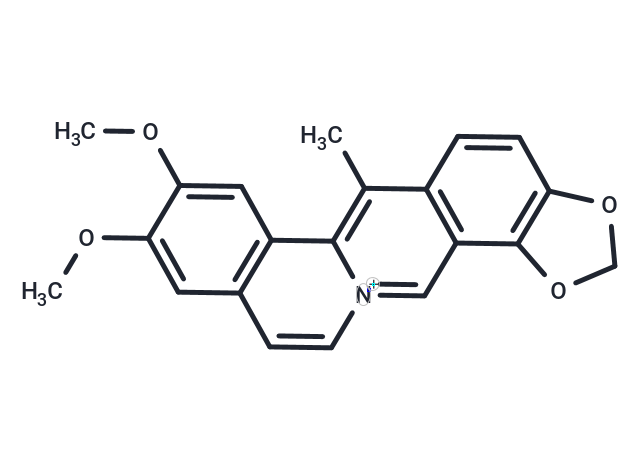Shopping Cart
- Remove All
 Your shopping cart is currently empty
Your shopping cart is currently empty

Dehydrocavidine (Dehydrocorydaline) has antitumor activity, it inhibits MCF-7 cell proliferation by inducing apoptosis mediated by regulating Bax/Bcl-2, activating caspases as well as cleaving PARP.

| Pack Size | Price | Availability | Quantity |
|---|---|---|---|
| 1 mg | $207 | 7-10 days | |
| 5 mg | $465 | 7-10 days | |
| 10 mg | $698 | 7-10 days | |
| 25 mg | $1,255 | 7-10 days | |
| 50 mg | $1,890 | 7-10 days |
| Description | Dehydrocavidine (Dehydrocorydaline) has antitumor activity, it inhibits MCF-7 cell proliferation by inducing apoptosis mediated by regulating Bax/Bcl-2, activating caspases as well as cleaving PARP. |
| In vitro | The complexation behavior of palmatine (P) and Dehydrocorydaline (DHC) alkaloid guest molecules by cucurbit[7]uril (CB7) host have been investigated by means of fluorescence spectra in aqueous phosphate buffer solution (pH 7.2). It is found that each alkaloid exhibits dramatic fluorescence enhancement upon complexation with CB7, and the intensity of the emittance is strong enough to be readily distinguished by the naked eye. Although the two guests possess similar structure, the complex stability constant of P with CB7 is 5.4 times larger than that of DHC. |
| Alias | Dehydrocorydaline |
| Molecular Weight | 348.37 |
| Formula | C21H18NO4 |
| Cas No. | 83218-34-2 |
| Relative Density. | no data available |
| Storage | Powder: -20°C for 3 years | In solvent: -80°C for 1 year | Shipping with blue ice. |

Copyright © 2015-2025 TargetMol Chemicals Inc. All Rights Reserved.